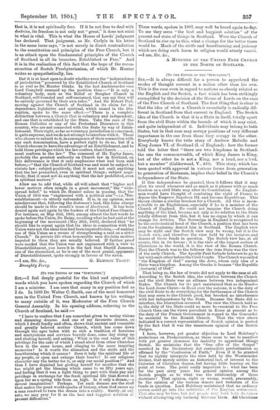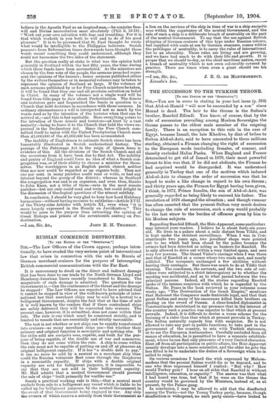[To THE EDITOR OF THE "SPECTATOR."] SIR,—It is always difficult
for a person to apprehend the modes of thought current in a nation other than his own. This is the case even in regard to nations so closely related as the English and the Scotch, a fact which has been strikingly exemplified by the decision of the House of Lords on the case of the Free Church of Scotland. The first thing that is clear is that the idea of what a Church is essentially is radically dif- ferent in Scotland from that current in England. The Scotch idea of the Church is that it is a State in itself, totally apart from the civil State within the bounds of which it may exist, and quite independent of it. Individuals may belong to both States, but in that case may occupy positions of very different importance in the one from those they occupy in the other. Everybody knows the trite story of Andrew Melville and King James VI. of Scotland (I. of England) : how the former told the latter that "there are two kingdoms in Scotland, the one the commonwealth, of which King James is King, but of the other he is not a King, nor a head, nor a lord, but a member" (Calderwood, V., 440). This story, which has been quoted with approval in various forms from generation to generation of Scotsmen, implies their belief in the Church's independence of the State.
If this independence be granted, then it follows that it may alter its creed whenever and as much as it pleases with as much freedom as a civil State may alter its Constitution. No English- man would have thought of combating the right of France to depose the Emperor Napoleon III. and become Republican. This theory claims a similar freedom for a Church. All this is incon- c3ivable to an Englishman, especially if he is a member of the Church of England. He could not imagine the Church doing anything of the kind, because not only is its relation to the State totally different from this, but it has no organ by which it can change its Articles. The Sovereign in England is recognised to be the ecclesiastical head of the Church, a position that has been from the beginning denied him in Scotland. The English view may be right and the Scotch view may be wrong, but it is the Scotch view, and therefore the view held by the testators and donors of those funds in question. The Scotch view has, at all events, this in its favour : it is the view of the largest section of Christians in the world, it is the view of the Roman Church. That the Church was to the believer the true State was the view of the early Church. The Apostle Paul forbade believers to go to law with each other before the Civil Courts. The Church was called "the Kingdom of God" among the Jews, whose only idea of a State was a kingdom. Among the Greeks it became "the Republic [groan/31a] of God."
That being so, the law of trusts did not apply to the ease at all. According to the Scotch idea, the relation between the Church and the civil State was an alliance between two independent States. The Church for its part maintained that as its Head— the Lord Jesus Christ—is Head over the nations, it is the duty of the civil State to do everything for the furtherance of the Church that may seem to the Church good, but brooked no interference with her independence by the State. Because the State did so interfere, the Disruption occurred. The view the Church held as to the duty of the State could no more be essential to the Free Church than can the views prevalent in Rome at present as to the duty of the French Government in regard to the Concordat be essential to the Romish Church. That the view above indicated is a correct representation of Scotch opinion is proved by the fact that it was the unanimous opinion of the Scotch Judges.
I have, however, yet greater objection to Lord Halsbury's prelections on Predestination, as these seem to me to manifest with yet greater clearness his inability to apprehend things Scotch. He maintains that the "free offer of the Gospel" asserted in the Declaratory Act contradicts predestination as affirmed by the "Confession of Faith." Even if it be granted that he rightly interprets the view held by the Westminster divines, that merely settles an historical fact, of interest to the historian of Christian dogma, but having little bearing on the point at issue. The point really important is : what has been for the past sixty years the general opinion among the Scotch people as to what was the relationship of these doctrines ? That opinion, right or wrong, would, presumably, be the opinion of the various donors and testators of the funds in question. Lord Halsbury maintained that no ordinary person could go into the subtleties of the Kantian antinomies. That also may be true, but yet people may hold both do:trines without attempting any harmony between them. All Christians
believe in the Apostle Paul as an inspired man,—he conjoins free- will and Divine necessitation most absolutely (Phil. ii. 12-13) : "Work out your own salvation with fear and trembling. For it is God which worketh in you both to will and to do of his good pleasure." It is to be presumed that St. Paul thought he wrote what would be intelligible to the Philippian believers. Scotch peasants from Reformation times downwards have thought these words meant something they could understand, although they could not harmonise the two sides of the statement.
But the question really at stake is what was the opinion hold generally in Scotland within the last fifty years, the time during which these funds have been accumulated. As the ministers are chosen by the free vote of the people, the sermons preached repre- sent the opinions of the hearers ; hence sermons published either by the writers themselves or in memorial volumes may be taken to represent the opinion of Scotland at large. If the volumes of such sermons published by or for Free Church ministers be taken, it will be found that they one and all proclaim salvation on belief in Christ. In many of the volumes not a single word will be found from title-page to finis about Predestination. The donors and testators gave and bequeathed the funds in question to a Church that held doctrines in accordance with these sermons. In ordinary circumstances a will is interpreted not so much by the words used as by the intention of the testator when that can be arrived at,—and this is but equitable. Here everything points to the intention of those donors and testators—at least by a vast majority—being to leave it to the Church that held the views ex- pressed in the Declaratory Act. Since the Free Church com- mitted itself to union with the United Presbyterian Church more than £1,000,000 of the -21,062,000 has been accumulated.
The inability of Englishmen to estimate Scotch views has been lamentably illustrated in Scotch ecclesiastical history. The passage of the Patronage Act in the reign of Queen Anne is evidence of this. All the divisions of the Scotch Church and all the secessions from it have been due to that Act. The nobility and gentry of England could form no idea of what a Scotch con- gregation was, or of their ability to choose a minister for them- selves. The worshippers in an English parish church neither then nor now could be regarded as an organic body. Then not one per cent, in many parishes could read or write, or had any interest beyond the gossip of the district ; whereas in Scotland the congregation was and is an organism, and even then, thanks to John Knox, not a tithe of them—save in the most remote parishes—but not only could read and write, but could delight in the discussion of theological questions of the utmost subtlety.
In conclusion, I should be very glad to hear how Lord Halsbury harmonises—without having recourse to subtleties—Article XVII. of the Thirty-nine Articles with Article XL, even when "it is more largely expressed in the Homily on Justification." This would be more to the purpose than extracting the opinion of Greek Bishops and priests of the seventeenth century on Pre- destination.



































 Previous page
Previous page